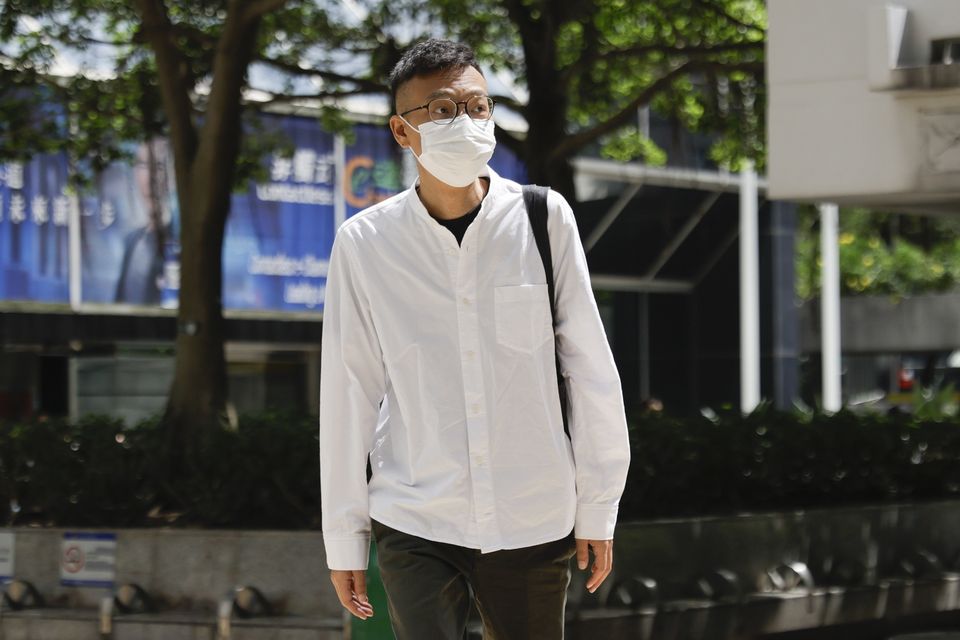A Hong Kong court has sentenced a former editor of a shuttered news publication to 21 months in prison in a sedition case that is widely seen as an indicator of media freedom in the city, once hailed as a beacon of press freedom in Asia.
A second editor was freed after his sentence was reduced because of ill health and time already served in custody.
Former Stand News editor-in-chief Chung Pui-kuen and former acting editor-in-chief Patrick Lam are the first journalists convicted under a colonial-era sedition law since the former British colony returned to Chinese rule in 1997.
Patrick Lam, the former acting editor-in-chief of Hong Kong’s now shuttered pro-democracy news outlet Stand News, arrives at the District Court in Wan Chai, Hong Kong, ahead of sentencing (May James/AP)
Chung was sentenced to 21 months, while Lam was allowed to go free.
The news outlet was one of the last in Hong Kong that dared to criticise authorities as Beijing imposed a crackdown on dissidents following massive pro-democracy protests in 2019.
The closure came months after the demise of pro-democracy newspaper Apple Daily, whose jailed founder Jimmy Lai is battling collusion charges under a tough national security law imposed by Beijing in 2020.
Last month, the court found Chung and Lam guilty of conspiracy to publish and reproduce seditious materials, along with Best Pencil (Hong Kong) Ltd, Stand News’ holding company.
They faced up to two years in prison and a fine of 5,000 Hong Kong dollars (£480).
Judge Kwok Wai-kin began the sentencing hearing two hours after the scheduled time.
After hearing further mitigation statements from the journalists’ lawyer, Audrey Eu, he said he needed some time to think about it.
The hearing was halted and then resumed later.
Judge Kwok wrote in his verdict in August that Stand News had become a tool for smearing the Beijing and Hong Kong governments during the 2019 protests.
He ruled that 11 articles published under the defendants’ leadership carried seditious intent, including commentaries written by activist Nathan Law and veteran journalists Allan Au and Chan Pui-man.
Chan, who is also Chung’s wife, earlier pleaded guilty in the Apple Daily case and is in custody awaiting her sentence.
Judge Kwok said Lam and Chung were aware of and agreed with the seditious intent, and that they made Stand News available as a platform to incite hatred against the Beijing and Hong Kong governments and the judiciary.
On Thursday morning, dozens of people waited in line to secure a seat in the courtroom.
Former Stand News reader Andrew Wong said he wanted to attend the hearing to show his support, though he felt it was like “attending a funeral”.
Mr Wong, who works in a non-governmental organisation, said he expected the convictions last month, but still felt “a sense that we’ve passed a point of no return” when he heard the verdict.
“Everything we had in the past is gone,” he said.
Their trial, which began in October 2022, lasted some 50 days.
The verdict was postponed several times for reasons including a wait for an appeal outcome in another landmark sedition case.
Their lawyer, Ms Eu, argued that the pair be sentenced to up to time served, saying their case was different because they were journalists whose duties were to report different people’s views.
She said the articles in question represented only a small portion of what Stand News had published.
The pair also stressed their journalistic mission in their mitigation letters.
They were detained for nearly a year after their arrests before being released on bail in late 2022.
Ms Eu said Lam has been diagnosed with a rare disease and she was concerned that he could not be treated by the hospital that handles his case if he were sent to jail again.
Lam also lost his chance to pursue overseas studies due to the case, she said.
Hong Kong was ranked 135 out of 180 territories in Reporters Without Borders’ latest World Press Freedom Index, down from 80 in 2021, and 18 in 2002.
Self-censorship has also become more common during the political crackdown on dissent following the 2019 protests, with increased reports of harassment against journalists in recent months.
In March, the city government enacted another new security law that raised concerns about further curtailment of press freedom.
